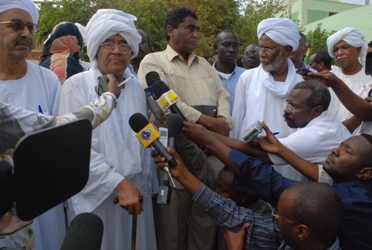Sudanese opposition divided over dialogue with NCP
February 9, 2014 (KHARTOUM) – The Popular Congress Party (PCP) led by Hassan al-Turabi has formally agreed to engage in a dialogue with the ruling National Congress Party (NCP) despite objections by other members of the opposition coalition known as the National Consensus Forces (NCF) .

Abdel-Salam stressed that their agreement to dialogue with the NCP is not open-ended adding that their divergence with the NCF on this issue is “procedural” adding that the PCP will stipulate that the ruling party remove restrictions on freedom as a key condition.
The PCP will also insist that it will not participate in the 2015 elections in its current form and allowing for the participation of the rebel coalition known as the Sudan Revolutionary Front (SRF) and other political forces in the dialogue in preparation for installing a fully transitional status.
Last month, the Sudanese president and the chairman of the NCP, Omer Hassan Al-Bashir, announced a 4-point plan for reform “to stop the war and bring peace, free political society, fight against poverty and revitalize national identity”, calling for political forces to engage in dialogue to agree on the implementation items though he did not specify practical steps to do so.
Mohammad Ziauddin, spokesman of the Baath Arab Socialist Party, wrote on his Facebook page that the NCF meeting discussed political developments in the country and concluded that the current situation in the country is deteriorating under the weight of the overall crisis.
He linked this to the regime crisis, the worsening economic crisis, the expansion of war and its repercussions and the continuation of the regime’s approach in confiscating freedoms.
Ziauddin further said that the meeting reiterated that any dialogue with the NCP is contingent upon abolishing all laws restricting freedoms, the release of detainees and prisoners convicted for political reasons, putting an end to war, agreeing that the SRF and all national forces are key players in any future dialogue, rejecting bilateral dialogues , the NCP agreeing in advance that the dialogue would lead to a transitional state and not to prolong the life of the regime or break up the opposition forces to disrupt the people’s awareness about their struggle and distract them from the goal to overthrow the regime .
The meeting also ruled out participating in the 2015 elections under the existing regime or in the preparation of a permanent constitution without the formation of a transitional government. They also ruled out moving forward by fixing the current regime or living with it but rather through removing it.
But the NCF chairman Farouk Abu-Essa said at a press conference today that they reject the move by any of their members to dialogue with the NCP noting that they agreed before to act as a team.
“Whoever wants to slip from us we have no stick [to prevent them]” Abu Essa said.
He said the agenda of the dialogue which was laid out by the NCP are issues needing a decision by its chairman al-Bashir and his party and not further dialogue. He added that the identity issue has never been a national problem until the regime came to power and adopted policies that created it.
(ST)
